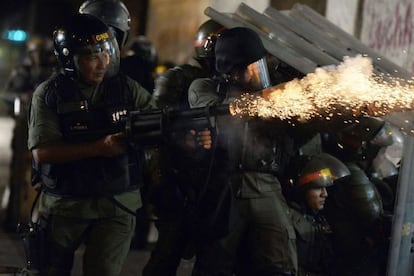Maduro sends in troops to “liberate” major opposition city
Lawmakers claim Venezuelan citizens’ rights were violated during raid

Hundreds of military troops and police converged on San Cristóbal, Táchira state early Sunday in a surprise assault aimed at quashing nearly two months of ongoing anti-government protests and unrest that has spread from the western Andean city across Venezuela.
The 300,000 residents of the city awoke Sunday to see their neighborhoods and streets filled with military tanks and police patrols. San Cristóbal has been considered the epicenter of the violence that has broken out across the country, which grew from a student demonstration to protest the lack of security at the University of the Andes following the attempted rape of a female student on campus in early February.
The protests swelled when three student leaders were arrested and sent to a holding facility in Falcón state. The move by law enforcement helped unite the opposition, which began calling for massive nationwide demonstrations on February 12.
The government’s assault in San Cristóbal came after three days of tense protests in some neighborhoods
Ahead of Sunday’s assault, government officials had called in reinforcements from other areas of the country to help retake around 70 city blocks they had determined were “resistance strongholds.” At around 5.30am, the military and law enforcement officers had declared victory in winning back certain neighborhoods, and the media later celebrated the “liberation” of the city.
Some weeks back, demonstrators dismantled an old combat tank that had been set up as part of a monument and used the parts as street barricades. Other road blocks included a dilapidated passenger bus and trash containers. By daybreak Sunday, all the barriers had been removed by the military, and key thoroughfares, such as Carabobo and Ferrero Tamayo avenues, were once again open.
The move came more than a week after President Nicolás Maduro jailed San Cristóbal’s opposition mayor, Daniel Ceballos, for failing to remove the street barricades. In a fast-track prosecution, the Supreme Court removed Ceballos from office and sentenced him to one year in prison for civil rebellion.
The death toll from the waves of nationwide protest stands at 39
The government’s assault in San Cristóbal came after three days of tense protests in some neighborhoods. In one incident on Saturday, a young man died when he was electrocuted and two of his friends were injured after they tried to pull down a fluorescent sign, which they intended to use as a street barricade.
The death toll from the waves of nationwide protests now stands at 39.
Defense Minister Carmen Meléndez and General Vladimir Padrino López, head of the Strategic Operations Command, and who both supervise the military incursion in San Cristóbal, criticized the press for describing the operation as repression. “How can you call a state action to quash violence and terror repression?” Padrino wrote via his Twitter account.
Although there were no official figures on the number of people injured, government authorities said that 11 demonstrators had been arrested. The opposition placed that figure at more than 300.
“People who weren’t even involved in the conflict were injured,” said opposition deputy Walter Márquez at a press conference on Sunday. “They threw tear gas inside homes, causing severe damage. Children and the elderly started choking and had to leave their houses. Many of those arrested have been tortured or have suffered degrading treatment on behalf of the authorities.”
The opposition said that it would present a complaint to the Inter-American Court for Human Rights in Costa Rica.
Tu suscripción se está usando en otro dispositivo
¿Quieres añadir otro usuario a tu suscripción?
Si continúas leyendo en este dispositivo, no se podrá leer en el otro.
FlechaTu suscripción se está usando en otro dispositivo y solo puedes acceder a EL PAÍS desde un dispositivo a la vez.
Si quieres compartir tu cuenta, cambia tu suscripción a la modalidad Premium, así podrás añadir otro usuario. Cada uno accederá con su propia cuenta de email, lo que os permitirá personalizar vuestra experiencia en EL PAÍS.
En el caso de no saber quién está usando tu cuenta, te recomendamos cambiar tu contraseña aquí.
Si decides continuar compartiendo tu cuenta, este mensaje se mostrará en tu dispositivo y en el de la otra persona que está usando tu cuenta de forma indefinida, afectando a tu experiencia de lectura. Puedes consultar aquí los términos y condiciones de la suscripción digital.








































